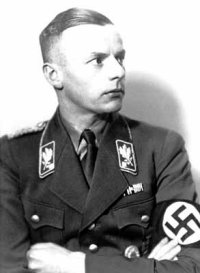Friedrich Krueger
| Friedrich-Wilhelm Krüger | |
|---|---|
 |
|
| Born |
8 May 1894 Straßburg, German Empire |
| Died | 10 May 1945 (aged 51) Eggelsberg, Allied-occupied Austria |
| Allegiance |
|
| Service/ |
|
| Rank | SS-Obergruppenführe und General der Waffe-SS |
| Service number |
NSDAP #171,199 SS #6,123 |
| Commands held |
SS and Police Leader Ost SS Division Nord |
| Battles/wars |
World War II |
| Awards | Knight's Cross of the Iron Cross |
| Other work | War crimes and crimes against humanity, including establishment of concentration camps, forced labor, and mass murder. |
Friedrich-Wilhelm Krüger (8 May 1894 – 10 May 1945) was a Nazi official and high-ranking member of the SA and the SS. Between 1939 and 1943 he was the Higher SS and Police Leader in the General Government in German-occupied Poland and in that capacity he organized and supervised numerous acts of crimes against humanity and had a major responsibility for the Holocaust. At the end of the war, he committed suicide.
Krüger was born into a military family in Strassburg, Alsace-Lorraine, Germany (nowadays in France) in 1894; he left school before graduating to begin a military career as a cadet in military schools in Karlsruhe and Gross-Lichterfelde. In June 1914, Krüger was commissioned a second lieutenant in the German Army when World War I broke out. During the course of the war, he was wounded three times and awarded the 1st and 2nd class Iron Crosses. In August 1919, he joined the Freikorps von Lützow, which he left in March 1920. Afterwards he returned to civilian employment and got married.
While working at a refuse company, he probably met Kurt Daluege, who was an engineer at the company at that time. He later on became SS commander in Berlin and leader of the Ordnungspolizei ("order police") or Orpo. The two men soon formed a friendship. In November 1929, Krüger joined the NSDAP (as member 171,199) ; in February 1931, he also joined the SS (6,123), which he left in April to transfer to the SA. With the help of Daluege, Krüger instantly acquired the SA rank and the power necessary to conduct reforms of the SA Formation East. He was promoted to SA-Gruppenführer in 1932 and joined Ernst Röhm's personal staff.
...
Wikipedia
